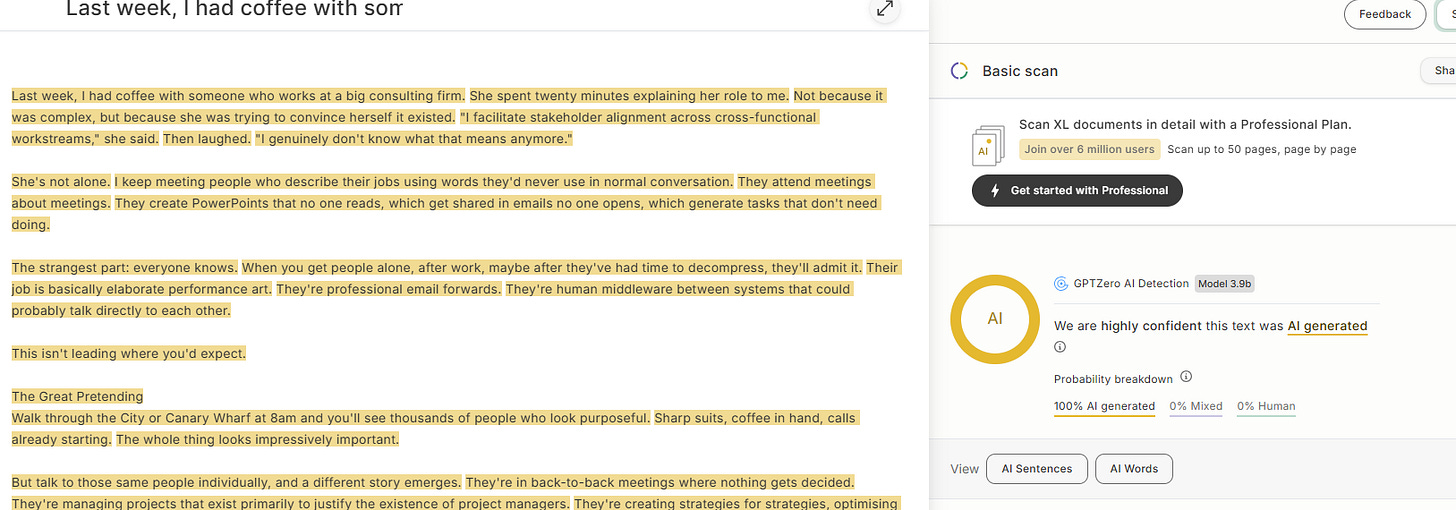The death of the Substack Writer.
Last week, I had coffee while reading a newsletter from a self-proclaimed “Substacker”. He spent paragraphs explaining his latest career wandering-piece, not because it was profound, but because he was trying to fill up space and tell you something you already knew in a way that still gathered eyeballs.
Then he said another writer stole his content, and I asked why he wouldn’t name them. I wondered why, and then I found out his newsletter was AI-generated. He didn’t write it. But he hit publish anyway, Substack (and plagiarists) applauded, then he complained about being ripped off, and you realized how he pumps out content so quick.
He’s not alone. I keep seeing newsletters rife with plagiarism and AI-generated content. And it’s not groundbreaking shit. Just things you already know arranged into phrases you’ve heard somewhere before, with catchy subtitles reinforcing vaguely familiar ideas.
The strangest part: everyone knows. When you put someone’s words through ChatGPT Zero, the truth is revealed. Their job is basically copying frameworks. They're professional copywriters and prompters. They're human middleware between conversations that need to be had offline.
This is kinda leading where you expect.
The Great Copying
Scroll through Substack Notes, and it’s looking like a hot mess version of LinkedIn. You’ll see thousands of people who look purposeful. Personal stories to gain subscribers, large font-framed quotes to gain subscribers, hot takes to gain subscribers, quippy strategies on how to write…to gain subscribers. It feels like a digital writer’s conference— best-selling gurus abound, clinics on “how to grow your paid subscriber base in the age of AI” and a proprietor taking 30% off the top.
But try to engage these gurus and you’ll find half of these people are copying each other, the other half are outsourcing their words to AI. Their jobs are “elaborate performance art,” yes — but so is their personal brand. A carefully engineered illusion to prove they’re building something when they’re not.
The pandemic pulled back the curtain for a moment. When everyone worked from home, they had time to call out people who were full of shit. People quit their corporate jobs (or got laid off) and started trying to figure out how to write for a living.
Now, white collar jobs are headed into the incinerator, and people are back to buying snake oil to save them from the AI apocalypse. But something’s shifted. The pretence feels different. More phony. More infuriating.
The digital economy of nonsense
Literary critic Rene Girard called this “memetic theory” - we’re copying each other to achieve desires that imitate the desires of others. We want what others seem to want, and in that mirroring, originality dissolves. But I think it's evolved beyond that. We've built entire ecosystems of mimetic nonsense.
Consider the average newsletter: it starts with someone identifying a real topic in the “Zeitgeist”. This triggers a cascade: a few thinkers generate solutions, hot takes abound, plagiarizers plagiarize, build a nonsense framework, and then sell it as a temporary solution, and the topic mutates because of it. Prompts are made. Newsletters are churned out. Notes crafted. Everyone plays their part in a never-ending improv routine where the only real product is attention.
Everyone involved knows this. The 100-subscriber substacker knows they don’t have the marketing chops to make it big (sorry, bruv). The guru knows their framework is just common sense in a matrix. The executive of the platform knows the whole thing is absurd theatre. But they all need each other to maintain the illusion.
It's like a writer’s version of the emperor's new clothes, except everyone can see the writer is a chatbot, everyone knows everyone can see it, but we've all agreed to keep complimenting his outfit because our sense of worth depends on believing that good writing will prevail.
Parallel performances
What’s emerging isn’t the collapse of writing - it’s something more interesting. People are building fake systems of fake value to subsidize a lifestyle that appears unchained to a corporation.
But it always is.
I know writers who use their “newsletter subscriber numbers” to build a coaching business, but jokes on them because corporate dollars subsidize subscriptions. They’re going to AI themselves out of subscribers.
They’re not stopping though. They’re using the same parasitic framework as corporations do to dupe readers and wanna-be influencers with the same allure of “building something real” outside the corporate infrastructure. The freelance writer role hasn’t died. It’s become a funding mechanism for career coaches and marketing gurus.
One person (me) called it the “corporate garbage chute” where these gurus survive on scraps of the corporate overlords until they eventually get boxed out by AI, or hired for a marketing position.
The Bold and the Shameless
My friends from writing groups are scattered across Medium, Beehiv and Substack, and virtually none of write because they believe their writing will make it big. They're "Bloggers" who write because they need to for survival, "academics" contributing to the Wall-E mountain of papers that people who get degrees at Costco could never read, "newsletter writers" updating their email subscribers about new projects in hopes that they’ll provide actual human value through inspiration.
And we’re supposed to believe that these are the ones that haven’t “made it big”?
The one’s that make it cut and run because they’ve undoubtedly screwed their friends over in some way. They make new ones, though. Clout brings lots of fans.
But instead of the existential crisis you'd expect, there's something else emerging. A kind of pragmatic acceptance coupled with creative subversion. They're showing up, playing the game, and accepting that there is no exit. We’re all Sisyphus pushing our little words up a hill.
Nobody believes in the writing/marketing guru/blogger career path anymore, even while performing it perfectly. The belief is gone, but the performance continues.
The Platform as auto-costume changer
Watch TikTok after a major news event. It's not just people shilling products—it's a mass transformation ritual. The person who posts in 2020 isn't the same person who’s posting today. They become programmed to lie.
I watch a particular make-up guru. Innocent and hurt by comments about her blatant lies at the beginning wheres she doesn’t disclose a mascara she’s promoting and is clearly wearing false eyelashes in the after video. Her posture changed with each PR box. Her body rearranged itself into something I can only describe as "Kim KAHDASHEEYAN" machine.
The reverse happens too. Jordan Peterson is worn thin from audience capture. The gradual shedding of an exoteric identity as his existential train moves closer to it’s final destination. By the time people reach the end, maybe they’ll be human again.
What actually dies
The writer isn’t dying in some dramatic collapse. It's dying like religion died for many people—slowly, through diminishing belief rather than disappearing churches.
The structures remain. The creamy keyboards still clack. The book deals still happen. The marketing campaigns still drip. But the faith that this activity means something, that it's building towards something worthwhile, that it justifies the life hours it consumes—that faith is evaporating.
What replaces it isn't clear yet. Maybe it's this parallel economy of people using writing as a platform. Maybe it's something we haven't seen yet. But the transition period—where we all pretend to believe in something we know is hollow—is unsustainable.
The most honest person I've met was a marketer who used to be on radio and she told me to “Use Alex Hormozi’s methodology. It works. Define your villain. Lean into your contradiction. And use your voice to stir emotion. Oh, and use ChatGPT to create a course to sell.”
The opportunity in the emptiness
If you're reading this as a Substacker, feeling like you're going slightly mad from the cognitive dissonance, you're not alone. The madness isn't in you—it's in the system that asks you to pretend that selling paid subscriptions in an era of AI and rampant plagiarism is a viable career.
The moment you stop believing in the modern writer’s fiction is the moment you can start using it. Once you see it as infrastructure rather than identity, as a resource rather than a calling, everything shifts.
Your writing doesn't need to be useful or eye-catching. It needs to be true. True to yourself. True to what you consider reality. True for the kind of world you want to see.
The death of the Substacker isn't a crisis. It's freedom from having to pretend your newsletter about how to write newsletters is your life's work.
Permission to stop trending
So here's your permission slip, if you need one: you can stop worrying about what’s trending on Substack. You can show up, write what you want, provide little bursts of hope, but you don't have to believe in the bullshit around you. You don't have to tie your identity to your about me page.
The people around you probably don't believe in it either. They're just waiting for someone else to admit it first.
The Substacker is dead. Whatever comes next will certainly be short-lived - another hustle, another lie to sell you something. But human honesty and integrity is one thing that can’t be stolen or automated.
So write with that.
(but don’t expect it to trend)




“But human honesty and integrity is one thing that can’t be stolen or automated.
So write with that.” Yes. Yes. Yes.
I am increasingly convinced that Notes is trending toward LinkedIn-esque slop rather than replacing Twitter because everyone is on here to promote themselves, sell their course on how to grow on substack, etc.
People used Twitter in the past to have interesting conversations - substackers use Notes as a source of lead generation for new subscribers / clients. Not sure if substack will be able to overcome this.